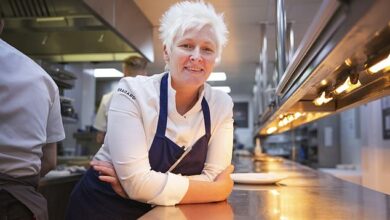I was 12 when I was taken hostage in Kuwait on Flight 149 because I was caught in a ‘secret MI6 operation’ – and the brutal terror of those four months has left me traumatised for life

Jenny Chappell’s childhood came to an abrupt end in August 1990, the summer she was turning 13.
Until then, life had been privileged and carefree. Her father, John, was a well-paid avionics engineer, who travelled the world with his job. Jenny and her family – her mother, Maureen, and her older brother, John – had lived in Germany, Italy and India. Aged eight, Jenny was sent to boarding school – St Bede’s, a prep school in Stafford – and quickly became immersed in classics and science. Her future looked bright.

On August 1, Jenny Chappell and her brother John were to fly to India, where their parents still lived, for the holidays
On August 1, she and her brother, 14, were to fly to India, where their parents still lived, for the holidays. They had taken the exact same flight the previous summer – London to Kuala Lumpur via Kuwait, then Madras (now Chennai) – only this time they were travelling with mum and dad, who had come back to the UK to stock up on favourites they could not get in India, like Jacob’s Cream Crackers, and to collect items for their flat.
The family boarded BA 149 at Heathrow Airport, and settled into the new, club world class at the front of the plane. The Boeing 747 took off at about 6pm UK time. Jenny was in a window seat, next to her friend. She read Lord of the Rings as the cabin crew served drinks. There were 367 passengers on board, including 11 children and 13 crew.
At around 1.15am BA 149 landed at Kuwait International Airport, where the plane was to be refuelled in preparation for the next leg to Madras. The stop was scheduled for about an hour, so some people got off to stretch their legs.
Jenny and her family stayed on board, however, and after a few minutes, she peered out of the window and saw a high speed blur. ‘It was military jets flying low over the airport,’ she recalls now. She assumed it was an exercise – Jenny’s father was ex-RAF, so she knew that aircrews practiced manoeuvres.
‘Then, I thought, “oh God, it’s a mid-air collision.”’
But in a split second the jets had moved on and whatever they’d dropped was falling.
‘Bombs! Why are they bombing the runway?’ she thought.
She turned to her brother to tell him what was happening, then – boom! – scraps of metal and concrete exploded in every direction.
What Jenny and her family had no way of knowing was that more than 100,000 combat-ready Iraqi troops and 200 tanks were gathered on the border between Iraq and Kuwait. For months, Iraq and Kuwait had been locked in a dispute over lucrative oil fields that straddled the border, and when peace talks between the two countries collapsed, the day before her family boarded the flight, there was only one likely outcome. Shortly before midnight, less than two hours before BA149 landed, Saddam Hussein gave the order to invade Kuwait.
Armoured divisions began to stream over the border. Fighter bombers were deployed: their foremost mission to attack Kuwait city and seize control of the airport.
BA 149 had flown into a war zone – and into the arms of a brutal dictator. All foreigners in the country were being rounded up by troops and, with the West immediately condemning Iraq’s move, Saddam made full use of the propaganda value provided by his ‘guests’.

The aircraft was at Kuwait Airport during the Iraqi invasion of August 2, 1990 and blown up by Iraqi forces when allied forced intervened
For the passengers and crew of Flight 149, an ordeal that would last for the next four months was only just beginning.
Herded to strategic centres in Kuwait and Iraq they were told by hostile Iraqi troops they would be the first to die in any military attack. There were mock executions. One hostage, then 24, held at a dam site in northern Iraq, was dragged out several times and had a gun put to his head before it was fired in the air. They were even told what order they would be executed in. They were kept in near-starvation conditions and some of the British Airways stewards and stewardesses were raped.
Now this extraordinary story of kidnap and terror is set to land in the British High Court. Earlier this month the passengers and crew of BA 149 launched a civil action against the UK government and British Airways, in a bid to receive compensation ‘for serious negligence and joint misfeasance in public office’.
The case revolves around what the British government, then headed by Margaret Thatcher, did or did not know about the chaos BA 149 flew into – and why it wanted that plane to land.
For years, Jenny and her fellow passengers believed it was ill-luck that had delivered them into Saddam’s clutches. Yet an investigation by Stephen Davis – author of The Secret History of Flight 149, published in 2022 – revealed an altogether different version of events.
For sitting at the back of the plane that day was a group of eight or so super-fit military-looking men – part of a secret MI6 unit being sent in to monitor the Iraqi invasion. An hour before the plane touched down, claims Davis, the British ambassador in Kuwait warned the Foreign Office about the invasion, and yet BA 149 was not diverted because the British government wanted to get the special ops team on the ground.
For three decades, that warning has been a closely-guarded secret. Now, the passengers intend to air in court their claim they were treated as ‘collateral damage’ and deliberately put in harm’s way by the British authorities.
The law firm McCue Jury & Partners is currently representing 95 claimants of nine nationalities.
‘They were victims of war crimes – including sexual assaults – that were then covered up the British government,’ says Davis, who has dedicated more than 33 years to proving it was no accident that the plane landed in a war zone.
‘They have been lied to and denied justice ever since. They are owed an apology and compensation for the actions of the government and BA which has left many of them traumatised to this day.’
In his recent book and podcast of the same name, Davis details how the existence of a warning was only revealed after the release of declassified documents in November 2021.
‘The lives and safety of innocent civilians were put at risk by the British government and British Airways for the sake of an off-the-books military operation,’ adds Matthew Jury, managing partner of McCue Jury & Partners.

Jennifer was 12 when she flew with her parents on Flight 149, where she was taken hostage by Saddam Hussein to be used as a human shield
‘Both have, we believe, concealed and denied the truth for more than 30 years. The government and BA watched on as children were paraded as human shields by a ruthless dictator, yet they did and admitted nothing.’
Jenny is part of the civil action.
‘My childhood was brutally ripped from me and I was made to know that life is cheap, and the world is horrible and violent and very, very dark,’ she says.
‘I feel so betrayed. The government might as well have wrapped that plane up in a big bow because they just handed over a nice little gift: here you go Saddam, have 400 hostages.’
I meet Jenny in Stafford, where she lives in a modest one-bed terraced house, with two cats. She has a 17-year daughter who lives with her father, Jenny’s ex-partner, who is a taxi driver, and his new partner.
Now 46, she is fine-boned, with translucent skin. At 5ft 8, she is the first to admit she is probably too thin. ‘I don’t eat very well,’ she says, a legacy of what happened in Kuwait, where there was often poor sanitation and little food.
‘Yellow rice slops contaminated with rodent faeces,’ according to one report.
She is nervous and chain smokes roll-ups, but she is also very angry.
‘I was left with severe mental health issues,’ she says. ‘I know I could have done things in the world. I shouldn’t be living in a council house, I’m intelligent, articulate, I could have gone into a professional career. Instead I’ve been left feeling like a burden, a drain, a failure.’
After the explosion of the bombs that day in 1990, cabin crew shepherded panicking passengers to the airport terminal and they were then driven by bus to an airport hotel.
Jenny and her brother had one room; her parents another. The following morning, as she looked out of the hotel window she could see the car park jammed with Kuwaitis trying to flee the city in their cars.
A horrific image from that morning has stayed with her ever since.
‘Iraqi tanks just drove over the cars with the people in them,’ she says, her eyes filling with tears.
She recalls hearing grown-ups talking of something terrible that had happened the morning they’d arrived at the hotel. A BA stewardess had been checking under the seats of the bus which had carried the passengers from the airport to the hotel, to make sure nothing was left behind, when an Iraqi soldier armed with an AK-47 rifle grabbed her and raped her. When BA crew complained to Iraqi officers about the attack, the rapist was taken away and shot.

Saddam Hussein on TV in 1990 with child pawn Stuart Lockwood, aged seven
A day or so later, they were moved to the Regency Palace Hotel, near Kuwait city centre. It was a curious mix: tennis courts and AK-47s. The hotel served one hot meal a day.
She played with other children and even celebrated her 13th birthday on August 5th. ‘Everyone sang happy birthday. I had a cake and a couple of presents.’ One of the stewards gave her a blue Swatch watch.
Yet two weeks later, on August 19, the Chappell family and 44 others were driven through the night on a bus to what was known as IBI camp, a collection of prefabricated bungalows on the outskirts of the city where British service personnel were being held.
On the way, the bus stopped near a tin shack at a refinery. No one seemed to know why this had happened, nor what the Iraqi guards had planned. The night air was chilly and Jenny heard whispers among the grown ups: ‘We’re going to die.’
She wondered if someone would give the order to shoot. ‘I thought we’d be shoved in the shack and it would be filled with bullets. Our bodies stacked up in there.’
But the moment passed and the bus drove on to the camp.
The family, billeted in a bungalow formerly inhabited by a British family called Lockwood, ate one meal a day, usually pasta or rice, though as the days went on, food became scarcer and sparser.
The atmosphere was tense. One day, Jenny and her brother were flying a kite and an Iraqi soldier came over to help them. ‘The next thing, my parents dragged me back to the bungalow and spelt it out to me: I could have been raped. As a child I’d assumed that even if something nasty like that happens, it only happened to adults. Suddenly, I was made aware that I was vulnerable. I was 13. I had red hair, I stood out.’
She had also hit puberty. Jenny had her first period on her first day in captivity. ‘My childhood had completely gone,’ she says. ‘My biggest fear was one of the soldiers would take a shine to me and there would be nothing I could do about it. Nothing happened, but for years afterwards I’ve have nightmares that my parents and the crew would get shot trying to save me.’
She had ‘jumped into a dark, adult world’ in Kuwait, she says.
The captives at the IBI camp had it easier than some of the other hostages, however. Elsewhere, some were made to dig their own ‘graves’ and threatened with mock executions.
Nevertheless, they worried they might never get home. John McCarthy, the journalist, had spent more than four years in captivity in Lebanon by then; Terry Waite, envoy for the Church of England, had been held hostage for over three and a half years, also in Lebanon.

The wreckage of a British Airways Boeing 747-136 at Kuwait City airport, after BA Flight 149 was detained
Then, one morning in late August, as suddenly as it had started, their ordeal came to a close. The women and children could leave (her father would be detained until December) after pressure from Western and Middle Eastern leaders.
They were taken by bus to Baghdad (‘a hellish ride – 18 hours with no water or food’) from where they boarded a flight to London. Jenny recalls getting off the plane and seeing a forest of cameras, journalists, and microphones. ‘It was really confusing.’
The euphoria of returning home soon gave way to the challenge of starting again. There was no debriefing or support from the authorities. No teacher sent her to a school guidance counsellor. No one took her to a therapist for trauma counselling. She was left to cope with her psychological distress on her own.
After a period of being bullied at a boarding school in Oxford, Jenny went to a state school near her home in Stafford. She got eight GCSEs but with mediocre grades. ‘Before I was an A-grade student, easy.
‘I tried to do my A levels about four times. I could never complete anything. Could never focus.’
She trained as a clerk but could not hold down a job. She moved from Stafford to London. Then came the chaos of drink, drugs and suicide attempts. From the age of 17-29, she tried to take her life around 20 times.
All in an attempt to numb the pain and forget the deeply traumatic memory of what happened to the innocent 12-year-old who had got on that plane.
It worked, but at a cost.
‘I struggle with my memory today,’ says Jenny. ‘I suspect it’s all in there and I have developed a habit of not accessing memories, good or bad.’
Aged 15, she was diagnosed with post-traumatic stress disorder, and more recently, in 2021, with emotionally unstable personality disorder.
‘It took 30 years to finally diagnose that I had a significant mental illness.’ She cries. ‘It’s cost me numerous relationships. It’s prevented me from working. And I’m only just receiving treatment now.’
Her brother married a Texan and now lives in America. ‘He has the same struggles as me,’ she says. ‘He hasn’t achieved anything like his potential. He couldn’t complete university, couldn’t cope.’
She hopes the legal action will ‘start the healing process’.
‘I want those responsible to admit that we have not made it up,’ she says. ‘We are not being drama queens, or oversensitive. We have been gaslit for over 33 years.’
You can call the Samaritans’ 24-hour helpline on 116 123, email jo@samaritans.org, visit a Samaritans branch in person or go to the Samaritans website.




